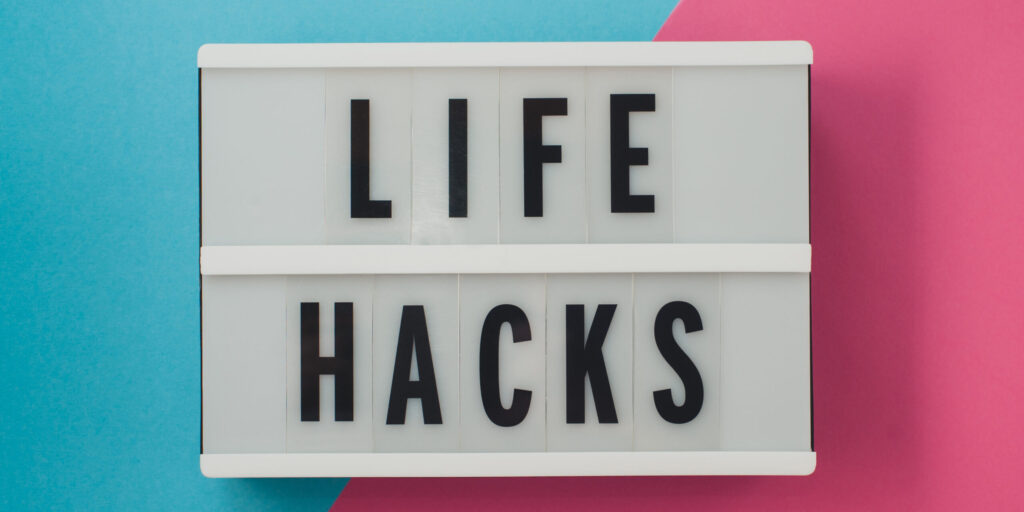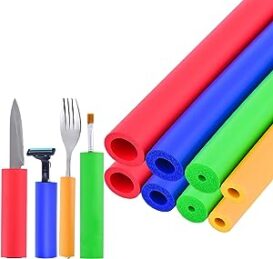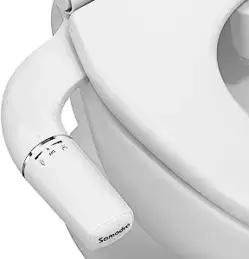
Easy, Expert-Level Life Hacks from an Occupational Therapist
By Rebecca Hume | Monday, August 21, 2023
Limited range of mobility, muscle weakness, contractures, and general muscle fatigue can often introduce challenges when it comes to independently completing daily tasks. Individuals living with neuromuscular disease are sometimes required to get creative in order to navigate areas of daily living as safely, efficiently, and effectively as possible.

Brooke Aarvig, Occupational Therapist at Spero Rehabilitation
Occupational Therapists (OTs) are professionally trained in the art of assessing challenges and limitations in areas of daily living and proposing viable solutions and modifications. And, contrary to common misconception, many of those recommendations are inexpensive and easy to manage at home.
Brooke Aarvig, an OT at Spero Rehabilitation’s outpatient neuromuscular clinic, provides assessments and recommendations to many patients living with neuromuscular disease. Brooke’s recommendations aim to increase safety and independence in areas of daily living, which include dressing/undressing, eating, bathing, toileting, and transferring. Below, she shares her expertise and favorite life hacks for easy and affordable modifications to your daily routine.
Life hacks for easier independent living
Dressing and undressing hacks
- Learn to dress in a seated position while shifting your weight on your bottom from side to side. This can be less tiresome and safer than standing.
- If one side of your body is weaker than the other side, always dress your weak side first and your strong side second. Do the opposite when undressing – undress your strong side first and your weak side second. “The weaker side will have a harder time doing the hard work that this sequence allows the stronger side to do – the heavier lifting and having to reach more,” Brooke says. “This is also beneficial for individuals with decreased range of motion due to contractures or muscle tightness.”
- Reachers can be helpful for reaching clothes on the floor or high up. They can also be used to reach your feet and help pull on socks, slippers, or simple sandals.
Eating Hacks
-

Foam tube grips can make it easier to hold silverware.
Opting for lightweight or plastic utensils can be helpful. If you need a bigger handle on your utensil, you can build up the handle with foam to allow for easier holding while staying light weight for eating. Brooke recommends these foam silverware grips that come in a variety of sizes.
- Long, flexible straws can be helpful for drinking if you are unable to manage a cup independently. There are also a lot of lightweight reusable straws on the market that can go in the dishwasher for easy cleanup, like these. And lightweight plastic cups with handles are an option if you can pick up a cup but can’t hold too much weight.
- If you have difficulty lifting your arms or holding your arms up for a period of time to eat (or even to do your makeup, brush your teeth, etc.), rest your elbows on the table or counter so that you do not have to exert strength by lifting your arm. “This is super helpful when dealing with muscle weakness or fatigue,” Brooke says. “An additional suggestion, use a tray to elevate items and a height adjustable chair and/or table to allow for comfortable posture.”
Bathing Hacks
- Swap out knob water handles for lever handles; they are much easier to use.
- Use automatic dispensers for liquid soaps, shampoos, and conditioners (depending on thickness). “I love the new automatic soap dispensers,” Brooke says. “These can be mounted to your bathroom walls – which prevents the need for managing bottles, lids, and even rags if you prefer to bathe with your hands.”
- Travel tube shower heads are portable shower heads designed to easily hook up to any shower. They are made of rubber and/or plastic and are much lighter than standard removable shower heads. “The baby ones are even lighter, too,” Brooke says, referencing portable shower heads marketed for children. “If you can find one with good pressure and don’t mind a little bit of color! These normally hook up to the tub spout, but some can also hook up to the top as well.”
Toileting Hacks
- Easy-install, bidet attachments can make toileting and maintaining hygiene easier and more manageable for individuals with limited reach.
-

Bidet attachments can make toileting easier.
Flushable wet wipes instead of dry toilet paper can make maintaining hygiene in bathroom easier to manage for some people.
- A long-handled reacher designed for toileting that grabs toilet paper or wipes can be helpful for individuals with limited range of motion.
- If you need to wear briefs for management of bowel and bladder, wear adult briefs instead of the hospital issued diapers. “These are so much more manageable, with less accidents and you can tear them down the side when you remove them,” Brooke says. “They’re similar to underwear, so you can go back and forth. And they won’t tear off unintentionally. They are just overall a better choice!”
Transferring Hacks
- Sit on higher seats, like bar-height or counter-height chairs instead of lower dining table-height chairs, or elevate lower seats so that you can sit on a higher surface. “Moving from a higher surface makes standing and transferring easier,” Brooke says. “Anterior tilt on power chairs is also super helpful for this.”
- For easier transferring in a seated position, use a sliding board to transfer from furniture to wheelchair and/or a sliding bench to transfer from the toilet to the shower.
- If you have a standard slide board, but a sheet under your bottom so that you will slide more easily. The sheet can make transferring smoother with less friction, especially if you are wet from the shower. Even better, opt for a pivot slide board that allows the seat itself to actually slide on the board instead of your body.
Everybody has a different body
While these general life hacks might prove useful to many people in the neuromuscular disease community, not every hack will work for every person. In fact, one of the reasons that Brooke chose to specialize in neuromuscular disease in her occupational therapy career is because every patient is different and the variety of needs demand creativity to find solutions to new and different challenges. Connecting with an OT through your local MDA Care Center or a referral from your PCP will provide additional, unique, specific hacks and suggestions to meet your individual needs.
Next Steps and Useful Resources
- Read more about living independently with a disability.
- Stay up-to-date on Quest content! Subscribe to Quest Magazine and Newsletter.
Disclaimer: No content on this site should ever be used as a substitute for direct medical advice from your doctor or other qualified clinician.




